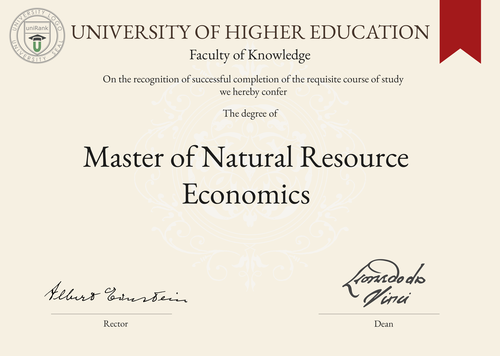
Master of Natural Resource Economics (M.N.R.E.)
Guide to University Programs/Courses
Master of Natural Resource Economics (M.N.R.E.)

Program/Course Name
Master of Natural Resource EconomicsProgram/Course Abbreviation
M.N.R.E.Duration Range
The duration of the program typically ranges from 1 to 2 years.Tuition range
The tuition fees for the program can vary depending on the chosen country or university. Please refer to the respective university's website for specific information.Overview
The Master of Natural Resource Economics program is designed to provide students with a comprehensive understanding of the economic principles and policies related to natural resources. It equips students with the necessary skills to analyze and manage natural resource issues from an economic perspective.Curriculum Overview by Year
The curriculum is structured to cover various aspects of natural resource economics over the course of the program. The specific courses offered may vary by university, but typically include:Year 1:- Introduction to Natural Resource Economics- Environmental Economics- Resource and Environmental Policy Analysis- Econometrics for Natural Resource EconomicsYear 2:- Advanced Topics in Natural Resource Economics- Sustainable Development and Natural Resource Management- Applied Econometrics in Natural Resource Economics- Research Project or ThesisKey Components
The key components of the Master of Natural Resource Economics program include:- Economic analysis of natural resource management- Environmental policy and regulation- Sustainable development and resource conservation- Econometric modeling and data analysis- Research methods and project workCareer Prospects
Graduates of the program can pursue various career paths in both public and private sectors. Potential career prospects include:- Natural resource economist- Environmental policy analyst- Sustainability consultant- Resource management specialist- Researcher or academic in the field of natural resource economicsSalary Expectations
Salary expectations for graduates of the Master of Natural Resource Economics program can vary depending on factors such as location, industry and level of experience. It is recommended to research specific job markets and industries for accurate salary information. For a more accurate understanding of salary expectations, you can utilize the Job Sites Search Engine, from our sister site jobRank, which searches over 4,600 job sites worldwide. Make sure to specify not only the job title but also the country you are interested in.Conclusions
It is important to note that the duration, tuition fees, curriculum, key components, career prospects and salary expectations of the Master of Natural Resource Economics program can vary based on the chosen country or location of study, as well as the university offering the program. Prospective students are advised to explore different universities and countries to find the best fit for their academic and career goals. Visitors can search for where this specific degree, the Master of Natural Resource Economics, is offered anywhere in the world through the uniRank World Universities Search Engine.World Universities Search Engine
search for Master of Natural Resource Economics (M.N.R.E.) and add the Location (country, state etc.) or specific University you are interested in studying at.
Query examples:
- Master of Natural Resource Economics (M.N.R.E.) United States
- Master of Natural Resource Economics (M.N.R.E.) United Kingdom online
- Master of Natural Resource Economics (M.N.R.E.) Australia international students
- Master of Natural Resource Economics (M.N.R.E.) University of California
- Master of Natural Resource Economics (M.N.R.E.) University of London tuition fees
- Master of Natural Resource Economics (M.N.R.E.) University of Sydney scholarships